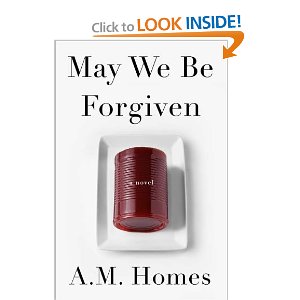“May We Be Forgiven” by A.M. Homes

A.M. Homes’ May We Be Forgiven May We Be Forgiven was a selection in this year’s Morning News Tournament of Books. Though friends have recommended Home’s books to me over the years, I hadn’t gotten around to reading her. But when I glanced at reviews, they seemed to say, eh, kinda bugged me, not her best. So as March went on, and as time to “catch up” on Tourney books became slight, I wondered if I should even bother with this 480-page tome. But since kind friend Amy lent it to me, a book in hand was better than one I’d have to pay to rent from the library, so I started it anyway. Then, I couldn’t put it down.
It’s told in short spurts with many breaks; this helps make a book more devour-able to me. I have two little boys and often have to put down my book to yell at them to stop fighting. Or, more rarely, compliment them on how well they’re playing together/practicing piano, doing homework, etc. The main character is Harold, whose bully of a younger brother, George (e.g., he insists he’s the older brother) gets in a good amount of legal trouble, is institutionalized, then gets in A GREAT DEAL of legal trouble, and Harold is left to take care of the house, kids, pets, and anything else that comes along. And a great deal comes along.
From the beginning, the excessive nature of George’s actions gave the novel a heightened feeling of reality that read to me as farce, not realism. That’s why I have trouble with the critiques of the novel that say it’s unrealistic. I think the author was pretty clear that it’s supposed to be hyper-real and weird. Beyond that, though, it’s funny while also being touching, and I found it just plain intriguing. Harry is a Nixon scholar who amused by by continuing to insist that “the story keeps unfolding.” I wanted to know what happened to these characters, and I was happy when some of them got their stuff together, including Harry.
However, it is hard to ignore the presence of a magical Negro, the white male savior, and the mythical man that every woman wants to sleep with. Was Homes using these cliches with irony? I did find it interesting that this was what a commenter in the ToB identified as a White Male EFF Up novel (WMFU), but is written by a woman, unlike other WMFU stories I can think of, like This is Where I Leave You, High Fidelity, Harry Revised, and more.
Edited to add: Also, what was with all the scat stuff? Nearly every character had an incident of uncontrollable diarrhea at some point. I wondered if this was a graphic allusion to a Jewish myth that claims the universe is something that God shat out, and our job as people in it is to create beauty in the midst of messy broken-ness.
The book didn’t make it far in the Tourney. It beat Billy Lynn’s Long Half Time Walk but went down to Building Stories (which I’m reading, or rather, squinting at, now). Apparently I’m the only person who sort of loved it, but now I’m excited to go read other books by Homes. And lucky me, there are a lot of them.
March 26th, 2013 at 5:41 pm
I’m done with TOB books except for Building Stories which I bought yesterday. I had to read (also squint at) the book that took out The Orphan Master’s Son. So happy it will be back in the zombie round and still predicting a final victory for it.
April 1st, 2013 at 8:42 am
Home’s This Book Will Save Your Life is a loopy blast and briefly made me want to move to California, go blond and be a health nut. I can see Peter Sellers as the main character. I have it if you want to borrow it (it has a saber-toothed tiger on the cover and a multicolored striped spine).
I’m very interested to read Last Report after G&M by the way, but will probably wait until after I read The Round House because I got that for Christmas.